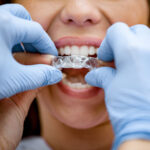Oral Cancer Screening
Early detection is of paramount importance in reducing mortality from oral cancer. Survival rates are above 80% if diagnosed early and below 30% later. Oral cancer, especially in men, is the 8th most common cancer worldwide.
Most of the oral tumours develop in areas that can be seen or noticed by your dentist, so early detection is possible. The distinctive early signs are painless white patches, painless red patches, sore bleeding area of long duration and persistent ulcer in the same spot for over 3-4 weeks.

What is oral cancer?
Cancer of the oral cavity is an overgrowth of abnormal tumour cells that form in the mouth and surrounding areas.
It can affect the lips, the gums, the tongue, the inner lining of the cheeks, the posterior area of the molars, the oral floor, the hard palate and the throat. It can originate in one point and spread to other zones of the mouth, move from and towards the larynx, the pharynx, the four cavities placed in the bones around the nose. For this reason, it is usually included in the group of head and neck tumours (oropharyngeal tumours).
Smoking, alcohol, sun exposure and HPV infection are all factors that can cause oral cancer. The tumours that form in the mouth can be quickly noted as they are not hidden, a simple check in the mirror will show you any changes. It is precisely for this reason that we must regularly perform self-analysis, and do not delay or put off regular checkups or screening of the oral cavity, which in some cases can save a life.
Oral cancer screening is an essential part of the head and neck examination routine.
The primary screening test for oral cancer is the systematic clinical examination of the mouth. The oral cancer screen includes the visual inspection of the face, neck, lips, labial mucosa, oral mucosa, gums, oral floor, tongue and palate. The examination also includes palpation of lymph nodes along the jaw and the front of the neck down to the thyroid gland. Any abnormality that lasts for more than three to four weeks should be investigated.
Initially, the symptoms can be mild and if left neglected, will give the disease a chance to advance undisturbed even in the surrounding areas. They are often confused with those produced by dental abscesses, normal recurrent ulceration periodontitis.
Warning signs to look out for would be, persistent ulcerations (over 4 weeks in the same spot), the formation of nodules or areas reddened or whitish, development of growths, difficulty swallowing, modifications in the voice, swelling in the neck, bleeding from the mouth or nose.
Often tumours are asymptomatic, contributing further to late diagnosis.
The main risk factors are:
- Age. With time passing, the mucous membrane loses some defensive properties towards the harmful environmental stimuli.
- Tobacco consumption. It is the leading risk factor for mouth cancer. More than 4000 substances are present in tobacco and resulting from its combustion. Many are toxic and irritant, more than 50 are carcinogenic. Also, physical damage to the mucous membranes of the mouth caused by the high temperature of cigarette smoke is a factor;
- Alcohol abuse. Alcohol and tobacco, in all its forms, reinforce each other’s harmful effects on the oral mucosa.
- Sun damage to the face, neck and lips.
Specific oral cancer screening tests conducted by our professionals remain an essential tool for early detection and identification. Put simply you have a better chance of surviving your cancer if it is diagnosed and treated early. Don’t ignore the signs. Remember they are usually not painful! Cancer that has spread to the surrounding areas require much more invasive and extensive treatment.
If we notice any areas that require further investigation an appropriate referral to an oral medicine specialist will be organised.
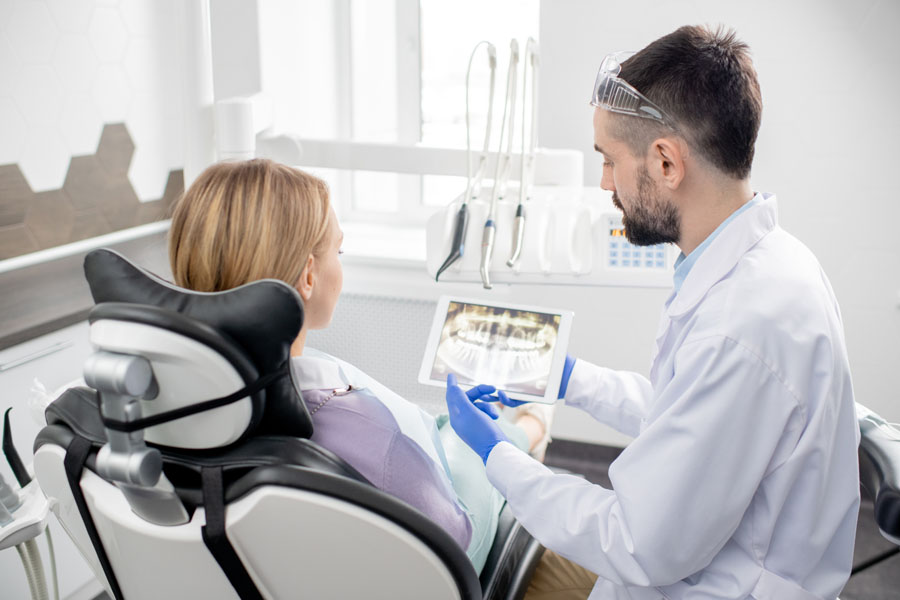
Act Now if you notice any change in your mouth!
If you notice anything unusual in your mouth, come see us and get checked over, waiting only leads to more worrying and the potential that the disease may grow.
If you are PRSI registered to contact us to see if you are eligible for a yearly scan, which includes an oral cancer screening and checkup for only 15 euro
| Treatment | Price |
|---|---|
| PRSI - Annual Examination (including oral cancer screening) | FREE |
| PRSI - Scale and Polish | €15-25 |
| Examination (including oral cancer screening) | €40 |
| Scale and Polish | €80 |
| Prescriptions | €30 |
| Fissure Sealants | €25 |
| Hygienist visit | €75 |
| Periodontal therapy/treatment of gum disease per visit | €80-90 |
| Dental Splint/Nite guard - Light | €200 |
| Dental Splint/Nite guard - Heavy Duty | €400 |
| Small X-rays | €10 each |
| Panoramic X-ray | €80 |
Other Treatments you may consider
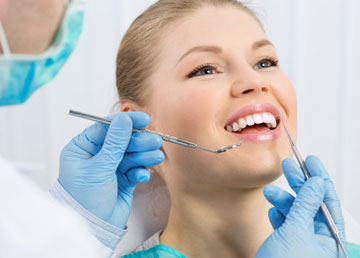
Dental Check-ups
Preventing small dental issues from flaring up into much more severe health problems is possible when you maintain a good check-up routine with our dentist. Both a check-up and consultation for additional dental services and treatments can help you to ensure proper oral health.

Dental Hygienist Visits
Preventing small dental issues from flaring up into much more severe health problems is possible when you maintain a good check-up routine with our dentist. Both a check-up and consultation for additional dental services and treatments can help you to ensure proper oral health.

Fissure Sealants
The molars in our mouth have chewing surfaces that may feel smooth but, in fact, have many natural fissures or grooves and pits. These fissures or grooves are where decay can often first be seen. Even with a healthy daily oral health care routine, some of these fissures cannot be cleaned well enough to keep the tooth decay-free.

Oral Cancer Screening
Early detection is of paramount importance in reducing mortality from oral cancer. Survival rates are above 80% if diagnosed early and below 30% later. Oral cancer, especially in men, is the 8th most common cancer worldwide. Most of the oral tumours develop in areas that can be seen or noticed by your dentist, so early detection is possible.
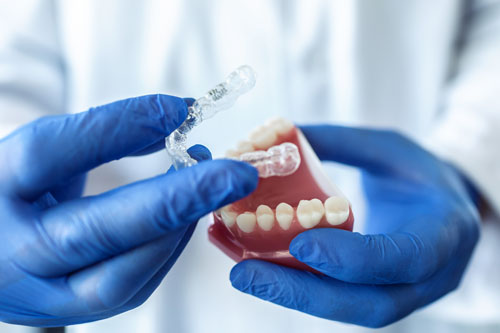
Gum Shields & Mouth Guards
Trauma to the teeth and mouth can result in lacerations and bleeding to the gums. It can also fracture or dislodge teeth. Whether as the result of an accidental strike directly to the mouth or due to a knock on the chin crashing your teeth together, impacts to the mouth can result in a variety of injuries, one more serious than the next.
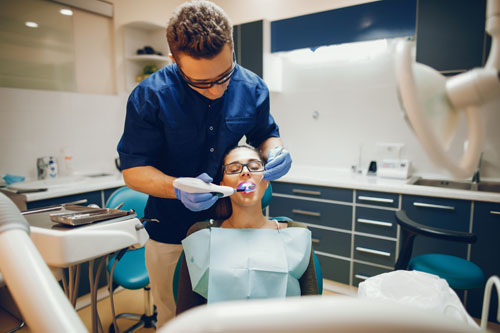
Root Canal Treatments
If your tooth has suffered an injury or perhaps you have severe decay in a tooth, you may require a root canal treatment. Early signs of permanent nerve damage may be a toothache coming on for no reason. Waking you from sleep and not responding to painkillers.
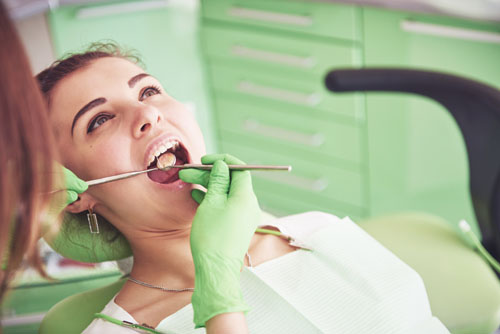
Tooth Fillings
A cavity is a small hole on a tooth that is the result of tooth decay. The sugar we eat and drink creates an acidic environment that allows the mineral to escape our tooth leaving a hole behind. If the cavity is not treated by a professional, you will be putting the tooth at risk of further decay and damage as the decay will continue inside the tooth unabated.
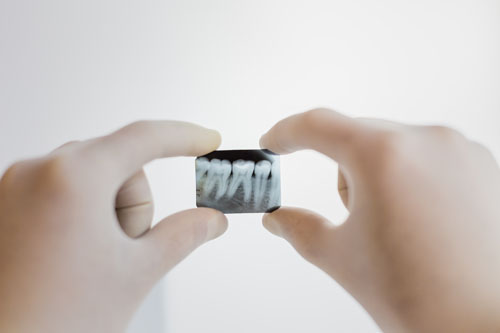
Wisdom Teeth Removal & General Extractions
There are several reasons that one or more teeth may need to be extracted. While no one enjoys hearing that they need to have teeth extracted, you’ll find that the compassionate and gentle touch our dentists offer will help to make the process just a little bit easier for you.
Meet The Team
We have a Fantastic group of highly trained, friendly dental staff to ensure you get the best treatment in Cork.
Get in Touch with us Today
Please call or email us via the contact form and we respond to you as soon as possible.
Contact Info
Phone: (021) 450 1306 / (021) 450 1250
Email: [email protected]



